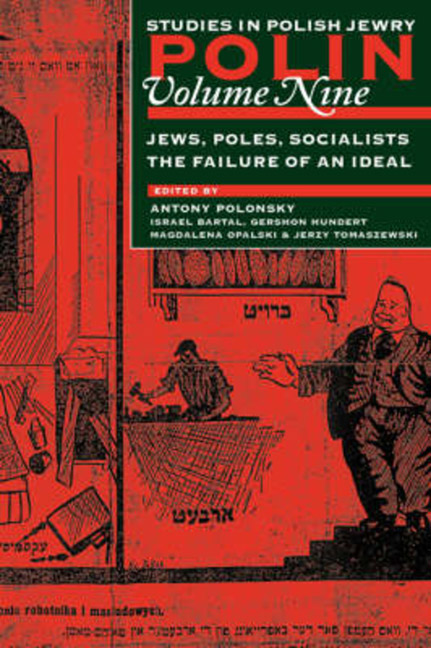Book contents
- Frontmatter
- Dedication
- Editors and Advisers
- Preface
- Acknowledgement
- Polin
- Polin: Studies in Polish Jewry
- Contents
- Note on Transliteration, Names, and Place Names
- Abbreviations
- Introduction
- PART I POLES, JEWS, SOCIALISTS: THE FAILURE OF AN IDEAL
- Jewish Socialists in the Kingdom of Poland
- The Jewish Problem in Polish Socialist Thought
- The Relation of the Polish Socialist Party: Proletariat to the Bund and the Jewish Question, 1900-1906
- The Jews, the Left, and the State Duma Elections in Warsaw in 1912: Selected Sources
- Jews and the Russian Revolution: A Note
- The Bund in Poland, 1935-1939
- Łodź Remained Red: Elections to the City Council of 27 September 1936
- The Jews of Vilna under Soviet Rule, 19 September-28 October 1939
- The Polish Underground and the Extermination of the Jews
- The Jewish Underground and the Polish Underground
- The Pogrom in Kieke on 4July 1946
- Antisemitism in Poland in 1956
- PART II NEW VIEWS
- PART III REVIEWS
- REVIEW ESSAYS
- BOOK REVIEWS
- Bibliography Of Polish-Jewish Studies, 1993
- Notes on Contributors
- Notes on Translators
- Glossary
- Index
The Jewish Problem in Polish Socialist Thought
from PART I - POLES, JEWS, SOCIALISTS: THE FAILURE OF AN IDEAL
- Frontmatter
- Dedication
- Editors and Advisers
- Preface
- Acknowledgement
- Polin
- Polin: Studies in Polish Jewry
- Contents
- Note on Transliteration, Names, and Place Names
- Abbreviations
- Introduction
- PART I POLES, JEWS, SOCIALISTS: THE FAILURE OF AN IDEAL
- Jewish Socialists in the Kingdom of Poland
- The Jewish Problem in Polish Socialist Thought
- The Relation of the Polish Socialist Party: Proletariat to the Bund and the Jewish Question, 1900-1906
- The Jews, the Left, and the State Duma Elections in Warsaw in 1912: Selected Sources
- Jews and the Russian Revolution: A Note
- The Bund in Poland, 1935-1939
- Łodź Remained Red: Elections to the City Council of 27 September 1936
- The Jews of Vilna under Soviet Rule, 19 September-28 October 1939
- The Polish Underground and the Extermination of the Jews
- The Jewish Underground and the Polish Underground
- The Pogrom in Kieke on 4July 1946
- Antisemitism in Poland in 1956
- PART II NEW VIEWS
- PART III REVIEWS
- REVIEW ESSAYS
- BOOK REVIEWS
- Bibliography Of Polish-Jewish Studies, 1993
- Notes on Contributors
- Notes on Translators
- Glossary
- Index
Summary
BY the Jewish problem, strictly speaking, we understand a mutual internal relationship between Christian societies and the Jews who live among them. It is a matter of the differentiation of Jews from the rest of society in traditional, social, and, in general, cultural terms; it is a matter of the current and future lifestyles of Jews in the midst of non-Jewish nations.
It was in this way that Józef Kwiatek, a prominent activist of the Polska Partia Socjalistyczna (PPS: Polish Socialist Party), defined the concept of the Jewish problem in a brochure entitled Kwestia żydowska [The Jewish problem]; it was issued in October 1904 as the 28th edition of the monthly, Latarnia [Lantern], published by the Polska Partia Socjalno-Demokratyczna Galicji i Śląska (PPSD: Polish Social Democratic Party of Galicia and Silesia). This definition was commonly accepted by Polish Socialists and Social Democrats. They were in general agreement concerning the genesis and existence of the Jewish problem within Polish territory and how it differed from the question of the socio-economic and cultural status of Jews in other countries, although some of the publicists and ideologists of the Polish workers’ movement, not always sharing the social democratic orientation-such as Socjaldemokracja Królestwa Polskiego i Litwy (SDKPiL: the Social Democracy of the Kingdom of Poland and Lithuania)emphasized above all the economic circumstances of the Jewish problem. What divided Socialist thinkers, however, was the variety of approaches to the solution of the problem, although all foresaw its disappearance along with the liquidation of unjust social relations. Some postulated assimilation as the one means of resolving it, others spoke out for full equality of Jewish people in every area of social life, and others again saw the solution in the realization of the idea of national-cultural autonomy, or within the framework of some similar form of national self-government.
The climax of disagreement among Polish Socialists over the Jewish matter took place in the first and fourth decades of the twentieth century. In the first period various concepts and viewpoints were worked out in an attempt to address the many new issues which arose at the turn of the last century as a result of the sociopolitical processes taking place in Jewish society in Poland.
- Type
- Chapter
- Information
- Jews, Poles, Socialists: The Failure of an Ideal , pp. 14 - 31Publisher: Liverpool University PressPrint publication year: 2008

